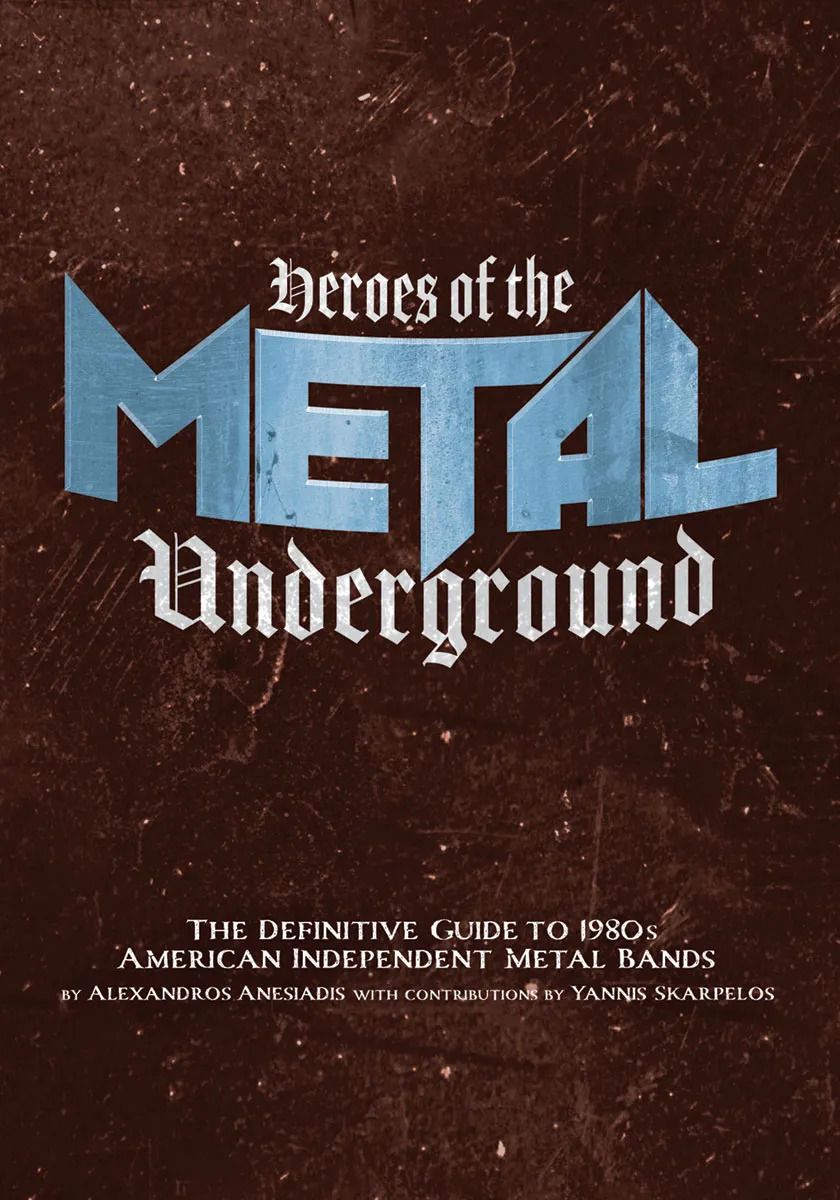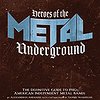Name: Alexandros Anesiadis
Occupation: Author
Nationality: Greek
Current publication: Alexandros Anesiadis's Heroes Of The Metal Underground, “the one and only encyclopedic book on independent American metal”, is out in the US via Feral House. Europe and the UK will follow on October 12th 2023. 
You mention that one reason you wrote the book is that there was some common ground between Punk and Hardcore on the one hand and the underground metal scene of the 1980s. What was this common ground?
D.I.Y.! That’s the common ground between hardcore punk and this US independent metal scene. Young kids, self-releasing their records, self-promoting their bands, and organize their touring by themselves.
What, for you, was the fascination of writing about this music?
I’m a fan of hardcore, punk and garage first and foremost. The fascination of writing on the US indie metal scene is my sheer curiosity; I knew beforehand that there was a huge underground metal scene, with bands that had much more integrity than the mainstream ones.
So, yes, the authentic nature and integrity of those bands was what fascinated me initially.
I take it you weren't actually present when these bands played and recorded. What's the appeal, for you, of immersing yourself in a time you never directly experienced yourself? What image emerged in your mind of this time, the people, the clubs, the “scene” etc?
Well, I couldn’t be there, since I was born in Greece, and by the time this was happening I was only 1 years old!
The image that emerged in my mind via the recollections of musicians and fans, is that there was a huge, vibrant, innocent scene, spreading all over the USA, even in the tinniest of places. But I guess this was the norm for rock n’ roll in the decades from 1960s to late 1990s.
Where do you see the difference in the stories of the genre across the globe and especially on both sides of the Atlantic?
The British were the ones that created it in the 1970s, they were the ones that later in NWOBHM blended punk, progressive rock, pub rock into their heavy metal and made it rougher, harder, and actually creating the first movement in heavy metal, spreading it all over the world.
In the USA, they grabbed what NWOBHM created, and perfected it in terms of sound and musicianship, and evolved it into much more subgenres.
Also, in the USA heavy metal found quite quickly a place in the market, while in the UK it remained underground, with the exception of a few NWOBHM bands.
How did the research for the project work?
It was just crazy! I was seeking endlessly through collector’s lists, through fanzines of the day, through databases, through everything!
I managed to identify around 1450 bands that self-released their record in the USA in-between 1980-1989, but I omitted reviews of 350 bands to add them in the second edition of the book, someday later…
What was the response of the musicians when you contacted them for the project?
All of them were unbelievably kind, humble, and more than welcome to help!
Actually, this was the case in all three books I have already done; there was only one person out of around 480 asked that was rude from day one (and I didn’t continue with his interview).
In terms of the writing and approach, what were some of the conclusions you drew from your previous book publications?
Crossover The Edge looks like it was my easiest effort, since I am a friend of hardcore and crossover, and been into it for around 25 years, collection records, going to the shows etc etc so it was an easy job writing it, as well as identifying the bands.
We Can Be The New Wind was my most challenging book to write; I had to create a background out of nothing. And even though I was familiar / fan of most of the bands that I got to interview, there were thousands that were popping up! The major difficulty in this book was that there wasn’t any reference, to be based on, so I had to do it by myself. But it was totally worth it, since I love these bands.
Heroes of the Metal Underground was challenging too, in terms of research. I had to be alert, and note down every tiny, little unknown metal band from the USA, it was like an endless quest! However, it quite helped me that there were some guides that I followed.
I'm curious as to why you chose to compile your conversations into a book of band portraits rather than a longer overview of the history.
I think that it flows really well. You can read about a band and its history, and on the same time read a review of their music, alongside what were their influences, their favorite bands, the local scene reaction to them etc etc. It’s quite convenient.
From conducting all these interviews, what, would you say, was the main driver behind the musicians and their music?
Their passion for creating music, just like the bands that were their influences. They wanted to play music, release records and tour the world.
True and Thrash metal in particular would instantly captivate many listeners and eventually grow into huge worldwide phenomena. What was it about this music specifically that turned listeners into extremely dedicated fans so quickly?
It was something new. And as for the dedication, that’s an issue of subcultural studies!
But let’s set it simple: metalheads, punks, hardcore kids have identified their every day life with the music that they love. They create friendships through the music that stay forever. And this is their way to escape from the norms of the society-it’s not just the lyrical / visual escapism of heavy metal, but its also the “escape from society” of punks.
Once you get into it, there’s no way back!
You dedicate some space in the introduction to the word “true” which holds a special meaning in metal. How would you sum it up after talking many of its purveyors? What is the core of the “metal faith” would you say?
Authenticity, integrity, respect for musical roots, rejection of mainstream practices and trends.
What is actually very significant, is that a band can even incorporate elements of other music genres, but still remain “true”. Look at Eternal Champion - they have included Cro-Mags (‘Best Wishes’ era), alongside The Icemen sounds into their music, and we are talking about classic NYHC bands. Nowadays, Eternal Champion are considered as the icepick of ‘true metal’ bands.
But if I would refer to the definition of ‘true metal’ bands in the 1980s, in accordance to the aforementioned, these would have been Cirith Ungol, Brocas Helm, Manilla Road, Halloween and Steel Vengeance.
Metal is an interesting genre when compared to pop. In pop, musicians are required to constantly change their identity and still remain identifiable. In metal, they are often asked to stay within their sound as much as possible and yet avoid repeating themselves. What's your take on this – how does metal music evolve at all if it seems so keen on keeping things the way they are?
That’s not an easy question to response in a few words - you can write a whole book on this one!
But let’s say that metal fans expect from their favorite bands to stick to a specific style, that they were great initially. That’s why many got so disappointed by Metallica in the 1990s or by what Slayer did on Diabolus in Musica.
I guess that metal has become more stagnant, though.
After conducting the interviews – plus those you did for your previous books – what's your theory on some of the biggest questions in rock/metal/punk music: Why do some bands manage to stay together while others break up? And what makes a band great while others disappear in the cracks of time?
I guess that bands stay together because of ambitions, and their ambitions being fulfilled, more or less. Other bands break-up mostly due to frictions, that either have to do with musical direction or personal issues.
Longevity, hard work, luck. Being lucky is a basic component to have a great career in music, and I will set it with just one small example: Leeway, Cro-Mags, The Brood, The Nils, Wargasm were all brilliant bands. However, they never got the recognition they deserved, because Profile Records never cared for them.
What, among all the bands you interviewed, were some of the most important musical discoveries for you personally?
Carnage, an excellent raw metal (with punk influences) combo. Spectral Incursion, absolutely intelligent and diverse, with great lyrics. Shyzgifter, crazy obscure and melancholic early 1980s hard rock/metal, with a progressive edge. Rellik and their ‘Remember the future’, can’t get more good metal than that!
Has working on this book possibly changed your preferences and tastes and made you listen to more metal lately?
Well, yes, I listen to a bit more metal lately, even though I continue to blast hardcore punk in my turntable, on a daily basis.
I managed also to buy some records off this book, and thank god for labels like Cult Metal Classics, Eat Metal, No Remorse and Heaven and Hell cause they are re-releasing so many stuff off this book, so you won’t have to break the piggy bank to get the originals.





